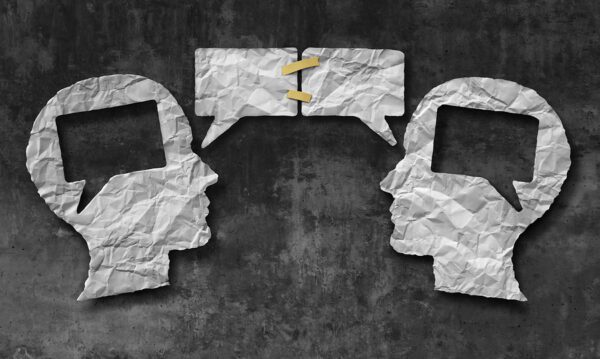
On Anger, Depression and the Need to Be Right
How Much Do You Need to Be Right or Point Out Other People’s Faults?
Why do we invest so much time and effort watering the roots of the relationships that make us happy, yet when we’re grappling with a sour mood, our ability to see the world from someone else’s eyes feels impossible? Does this ever happen to you?
The man or woman you love so much is sitting right in front of you, but all you can think about is how you won’t give in until they not only acknowledge how you feel, but tell you that you’re also RIGHT!. You’re even willing to ruin a date night, sabotage an opportunity for intimacy, or avoid talking to them for days until they submit. You’re furious and you can’t step out of it.
We’ve all been there. We usually reserve this type of behavior for the ones we love the most or have known the longest. If we are feeling unheard or misunderstood, we may forget to listen. If we feel accused of wrongdoing, we may dodge responsibility at all cost and focus on convincing the accuser that they’re wrong.
If a deep-seated insecurity fuels the need to be right, then the fight to prove rightness can potentially go on for days, weeks, months, and even years. The need to be right and the tendency to make others wrong tends to promote long-term resentment and animosity in relationships. This state of mind may suppress the immune system and invite illness into the body, and it is likely to limit our repertoire of problem-solving behaviors.
I find that an overinvestment in being right tends to promote more frequent states of dissatisfaction in relationships and with life in general. Depression may promote the need to be right (and vice versa). When we feel low, the act of making other people wrong can give a temporary lift to our sense of self-importance. The problem with this kind of lift is that it only lasts for a brief moment, and as soon as the high of asserting our rightness passes, we either sink back into a depressed state, or we feel even lower than we did before we made a heavy investment in making someone wrong. In more intense states of depression, we often lack motivation to perform the activities that we usually enjoy. Our energy is devoted to completing the most basic of tasks, as we do our best just to get through the day. In this state of decreased motivation, the mental energy available for entertaining the perspective of others is often quite limited.
The truth is that we are all forced to endure depression at some point, although its severity, duration and impact on our functioning varies from person to person. Depression typically involves periods of sad mood, decreased motivation, and a heightened tendency to avoid feelings and situations that normally brings us a sense of connection, purpose, and fulfillment.
When we are feeling significantly depressed, we may experience anger that is directed inward toward the self, or outward toward other people or the world as a whole. These angry feelings may take the form of an “addiction” to making other people wrong. In such a state of mind, our world becomes very small. We see with blinders on. There is only one way and it is our way. Hence, when anger takes over, our ability to see things from someone else’s point of view can become severely compromised, especially if our tendency is to cope with our anger by punishing others (and giving ourselves the illusion of ridding ourselves of negative feelings) by making them feel as we feel. An openness to entertaining multiple perspectives may also be limited if we typically handle our anger by withdrawing and avoiding conflict, which tends to minimize opportunities for rectifying disagreements.
Anxiety is similar to anger in its influence on perspective-taking abilities, as it can promote a narrowing the lense of our perspective at the expense of appreciating alternative vantage points. When we are anxious, our mental resources are channeled toward coping with the belief that we must prepare for a feared event. This preparation creates a self-preserving state of mind that narrows our perspective to a limited number of possible outcomes. We repeat to ourselves in one form or another the idea that “I will not be OK if this event happens.” When we are gripped by high anxiety, predicting a catastrophe requires a huge amount of mental energy, which deprives us of the energy required to appreciate someone else’s perspective.
Would you like to achieve lasting states of positive emotion? Would you like to feel more strongly connected to your loved ones, and to your world in general? If so, cultivate your ability to see someone else’s perspective, and recognize the impact that your words and actions have on the ones you love; this will tame your innate human need to be right. Your willingness to acknowledge the perspective of others, even if you disagree with their stance, is one of the most important mental muscles to build.
How to Build Empathy and Improve Perspective-Taking Skills
Here are a few brief suggestions for assessing and improving your ability to appreciate the perspective of others.
1) Conduct an honest assessment of how invested you are in making people wrong, especially the people closest to you. Ask a trusted friend or family member to give their opinion on this. Try to be open to their feedback, especially if you are both emotionally invested in the relationship. When it comes to how often we feel the need to be right, we are usually poor self-evaluators.
2) Practice the art of listening without interrupting. Avoid telling others how they should feel. Try to listen well enough to be able to convey to the speaker what you just heard them say, and then share what you learned from them.
3) Try to embrace the idea that there are “two rights” in every disagreement between two people.
4) Seek professional help if you determine that your need to make others wrong significantly interferes with your relationships, or if you can see that depression, anger, or anxiety present obstacles to appreciating others’ perspectives.
5) Practice doing gratitude exercises. This is one of the most powerful ways to cultivate the ability to appreciate others’ opinions and struggles. There are many self-help books available to assist you with this.
6) When you are sitting in a restaurant or coffee shop, or another setting conducive to “people-watching,” imagine what life might look like from the eyes of someone you are observing. Try to get in touch with what this person might be feeling, even if you are guessing . Do this exercise at least once a week.
7) If you recognize that you are particularly depressed or angry on a given day, take a pause in each interaction with the people you love and acknowledge to yourself (or to them) how your negative mood may be making you more argumentative or less understanding. Sometimes our loved ones deserve this “heads up.”
Thank you for taking the time to read this post. If you commit to improving your ability to adopt another person’s perspective and avoid the habit of making other people wrong, I am confident that you will like the way that it makes you feel. It might even bring you closer to the people you love.
Related Posts
Recent Media Contributions
Dr. Greg Kushnick, A Top Mental Health Expert in New York City Here are some of...
The Starting Point for Managing Anxiety
As a psychologist in New York City who has conducted thousands of sessions...


